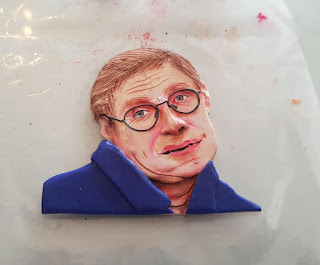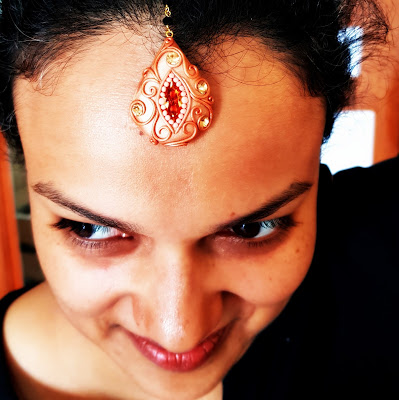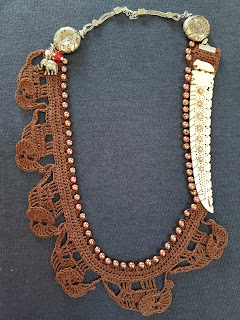Hello All,
I often come across this question - Why (and how) do you write product descriptions of the smallest of creation at Art'zire. So, I set about answering this question today......
The beginning of the post is with a quote I can relate to, recommend and utilize all the time: People may forget what you did for them, but they'll never forget how you made them feel.
Writing about a product is probably an Art or maybe, Science (I often abide more by Science than I do by Art). So, let me take you through what goes on in my mind when I write about products (I'm no business Guru, this is just how I do things)........
1. Process of making: Most times, my posts outline the struggles/challenges/victories/improvements I go through while making a particular piece. Most times, people have no idea what goes into handmade because, come to think of it, how many people have actually SEEN anything handmade being made in front of their eyes? When automated process are doling out cheaper (and identical) products by the dozens a minute, you have an uphill task, as it is, in competing with them. Where you lose is exactly where you win too. A mass manufactured product can never replace the eye for detail, the conversations with the client for personalization and a keen interest in doing one's best. Tell the people how you made it (even if you want to keep the details secret, do outline the process) to give them an idea of what makes your work a work of Art......
2. "Feel your product": What feeling does your work invoke in you? Does it make you think of something? Or someone? Does it bring some memories back? Everything you look at makes you think, just think a bit harder when it comes to your products. For example,
When we made this set, there were hardly any specifics. We focused for a long time (nearly 1 hour long discussion) on technicalities, but the final design was highly arbitrarily put together. Once the piece was made, the only thing that came to my mind was - I would love to pass it along as a heritage to my child (along with the story of what it took to make this). And the name of this creation is the Hindi word for legacy/heritage.
3. Naming: You'd have noticed that I often use other languages to name products. It's not that I don't like Hindi or English, it's just that sometimes, the words in other languages make me feel that I've done justice to what we've made. The notable exception being peacocks. We've made so many that I ran out of words for peacock in Hindi, Sanskrit, Tamil, Bengali, French, Italian, German :D There is no end to the number of peacocks we seem to make! And the additional burden of doing justice to the majesty of a peacock poses its own set of problems!
4. Creative imagery: Now, this last one is a bit tricky.........creative imagery is highly subjective. This is where reading helps. When I name a product, I try to conjure up circumstances where I'd wear/flaunt a particular creation or what it makes me feel. It could be anything from a kids' playground (with creations customized for children) to a wedding (with all its pomp and show). Using the right words can make all the difference! It's like taking your readers on a journey and choosing the right vehicle. You can't take a limousine to an animal safari and you can't can't take a mini truck to visit a queen. The discretion there is priceless and the more you write, the more you get a hang of it. A helpful suggestion is: READ! There's no substitute to reading, to work on your vocabulary, your grammar and your expression. Some of the authors I admire for their creative imagery are: Prem Chand (Oh yes, I LOVE his writing and how vivid a picture he paints of what he intends to convey), Harivansh Rai Bachchan, Sir A. C. Doyle (I have lived many a day in the world of Sherlock Holmes), Robert Frost, Thomas Hardy and Ruskin Bond. I could go on and on but well, in short, READ! Read a lot!
Hope the post helps artists who wish to write about their products. Just remember, you're a guide to your customers into the world of creativity.........make it joyful for them :)
- Pritesh
I often come across this question - Why (and how) do you write product descriptions of the smallest of creation at Art'zire. So, I set about answering this question today......
The beginning of the post is with a quote I can relate to, recommend and utilize all the time: People may forget what you did for them, but they'll never forget how you made them feel.
Writing about a product is probably an Art or maybe, Science (I often abide more by Science than I do by Art). So, let me take you through what goes on in my mind when I write about products (I'm no business Guru, this is just how I do things)........
1. Process of making: Most times, my posts outline the struggles/challenges/victories/improvements I go through while making a particular piece. Most times, people have no idea what goes into handmade because, come to think of it, how many people have actually SEEN anything handmade being made in front of their eyes? When automated process are doling out cheaper (and identical) products by the dozens a minute, you have an uphill task, as it is, in competing with them. Where you lose is exactly where you win too. A mass manufactured product can never replace the eye for detail, the conversations with the client for personalization and a keen interest in doing one's best. Tell the people how you made it (even if you want to keep the details secret, do outline the process) to give them an idea of what makes your work a work of Art......
2. "Feel your product": What feeling does your work invoke in you? Does it make you think of something? Or someone? Does it bring some memories back? Everything you look at makes you think, just think a bit harder when it comes to your products. For example,
When we made this set, there were hardly any specifics. We focused for a long time (nearly 1 hour long discussion) on technicalities, but the final design was highly arbitrarily put together. Once the piece was made, the only thing that came to my mind was - I would love to pass it along as a heritage to my child (along with the story of what it took to make this). And the name of this creation is the Hindi word for legacy/heritage.
3. Naming: You'd have noticed that I often use other languages to name products. It's not that I don't like Hindi or English, it's just that sometimes, the words in other languages make me feel that I've done justice to what we've made. The notable exception being peacocks. We've made so many that I ran out of words for peacock in Hindi, Sanskrit, Tamil, Bengali, French, Italian, German :D There is no end to the number of peacocks we seem to make! And the additional burden of doing justice to the majesty of a peacock poses its own set of problems!
4. Creative imagery: Now, this last one is a bit tricky.........creative imagery is highly subjective. This is where reading helps. When I name a product, I try to conjure up circumstances where I'd wear/flaunt a particular creation or what it makes me feel. It could be anything from a kids' playground (with creations customized for children) to a wedding (with all its pomp and show). Using the right words can make all the difference! It's like taking your readers on a journey and choosing the right vehicle. You can't take a limousine to an animal safari and you can't can't take a mini truck to visit a queen. The discretion there is priceless and the more you write, the more you get a hang of it. A helpful suggestion is: READ! There's no substitute to reading, to work on your vocabulary, your grammar and your expression. Some of the authors I admire for their creative imagery are: Prem Chand (Oh yes, I LOVE his writing and how vivid a picture he paints of what he intends to convey), Harivansh Rai Bachchan, Sir A. C. Doyle (I have lived many a day in the world of Sherlock Holmes), Robert Frost, Thomas Hardy and Ruskin Bond. I could go on and on but well, in short, READ! Read a lot!
Hope the post helps artists who wish to write about their products. Just remember, you're a guide to your customers into the world of creativity.........make it joyful for them :)
- Pritesh






























